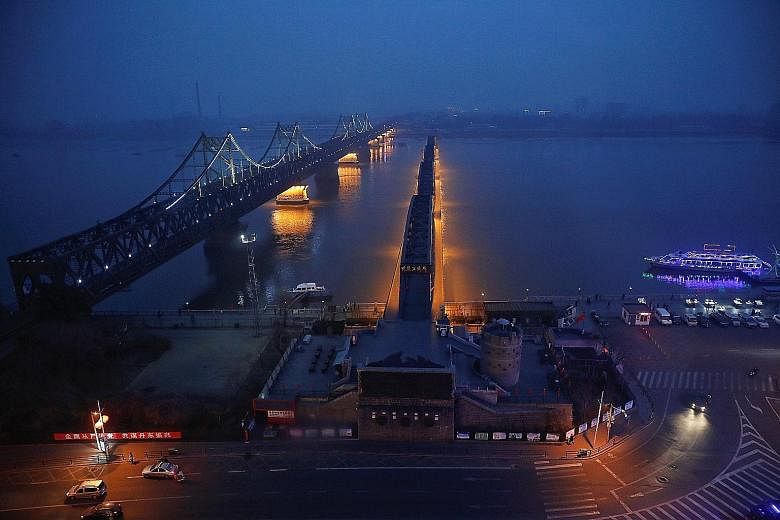DANDONG (China) • As the end of the fashion season approached, the suits and dresses arrived in the company's warehouses here in the Chinese border town of Dandong.
The company's accountant crammed about US$100,000 (S$140, 000) into a backpack, then she boarded a rickety train with several co-workers.
The accountant asked to be identified by only her surname, Lang, given the sensitivity of their destination: North Korea.
After a six-hour journey, she said, they arrived at a factory where hundreds of women using high-end European machines sewed clothes with "Made in China" labels.
Her boss handed the money - all of it in US dollar bills as required - to the North Korean manager.
Despite seven rounds of United Nations sanctions over the past 11 years, including a ban on "bulk cash" transfers, large avenues of trade remain open to North Korea, allowing it to earn foreign currency to sustain its economy and finance its programme to build a nuclear weapon that can strike the United States.
• Fraudulent labelling helps support its garment industry, which generated more than US$500 million for the isolated nation last year, according to Chinese trade data.
•North Korea earned an additional US$1.1 billion selling coal to China last year, using a loophole in the ban on such exports.
•Tens of thousands of North Koreans who work overseas as labourers are forced to send back as much as US$250 million annually, researchers say.
•Diplomats estimate the country makes another US$70 million selling the rights to harvest seafood from its waters.
China accounts for more than 80 per cent of trade with North Korea, and the Trump administration in Washington is counting on Beijing to use that leverage to pressure it into giving up its nuclear arsenal.
Beijing took a big step in February by announcing that it was suspending imports of coal from the country until the end of the year.
But China has a long record of shielding North Korea from more painful sanctions because it is afraid of a regime collapse that could send refugees streaming across the border and leave it with a more hostile neighbour.
In addition, Beijing now has a sympathetic ear in South Korea, where newly-elected President Moon Jae In echoes its view that sanctions alone will not be enough to persuade Pyongyang to abandon its nuclear programme.
While North Korea remains impoverished and dependent on food aid, its economy appears to be growing, partly because of a limited embrace of market forces since its leader Kim Jong Un came to power more than five years ago.
Foreign trade, primarily with China, has surged, too, more than doubling since 2000, though it has slipped in the past three years.
In theory, North Korea's greater openness to trade makes it more vulnerable to sanctions, with new potential targets and pressure points.
But it also highlights the limits of an approach to sanctions - defined largely by China at the UN - that aims to punish North Korea's military and ruling elite while sparing its people.
As trade expands, the lines have blurred. China has kept North Korea's garment sector off the list of industries targeted by UN sanctions, arguing that punishing it would hurt ordinary people and not military programmes. It has protected North Korea's seafood industry using the same argument.
But it is difficult to say who benefits from this trade, in part because even private enterprise in North Korea is overseen by state officials who extract taxes and bribes.
"Whether the proceeds from the textile industry support the nuclear programme is an open question," said Pennsylvania State University professor Joseph M. DeThomas, a former US envoy involved in sanctions policy. "Money is fungible."
NY TIMES


